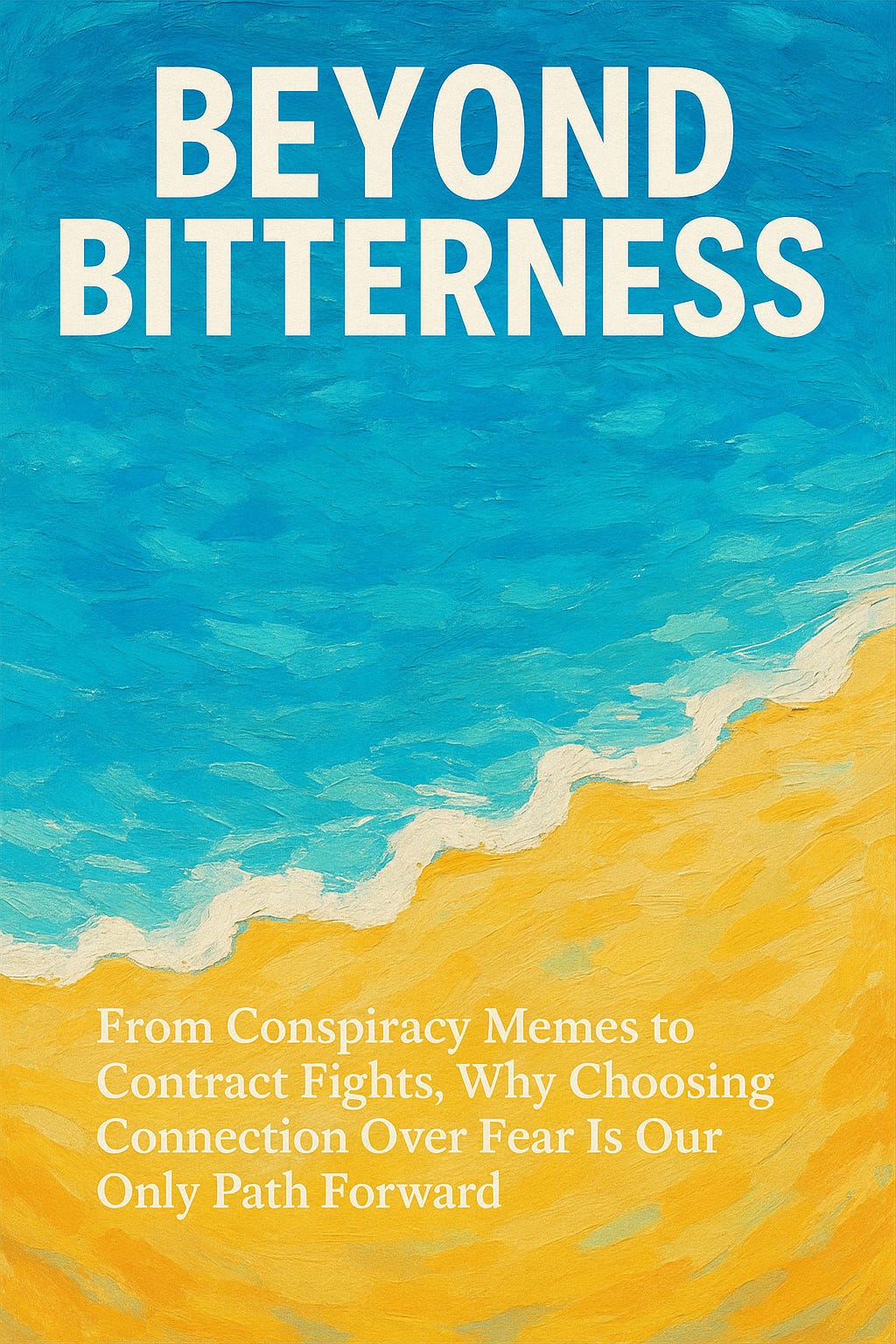Beyond Bitterness
From Conspiracy Memes to Contract Fights, Why Choosing Connection Over Fear Is Our Only Path Forward
I recently finished reading The House in the Cerulean Sea by TJ Klune (2020). It’s a touching story, and one I hope anyone who hasn’t read it yet will take the time. What struck me is how relevant many of its themes are to today’s political landscape, both nationally and within my beloved union. Emotions drive all of us, and as more of our news and social interactions come in short bursts (tweets, memes, TikTok clips) our patience for longer forms of engagement diminishes. Even in person, many of us stay glued to our screens, checking notifications instead of talking face-to-face. That constant exposure creates fertile ground for small groups to amplify conspiracy theories and prey on our fears, something research shows happens when misinformation spreads unchecked on social media (Guess & Lyons, 2020; Pennycook & Rand, 2019). This year in schools across NYC, teachers already report seeing the benefits of reducing screen dependence. I believe that New York’s new bell-to-bell cell phone ban will have measurable positive effects on focus and interaction in classrooms, but we will have to wait and see if that prediction holds to be true.
This will be a drastic transition, but stick with me, I assure you it will make sense.
This weekend, I went to see a live band with close friends, something I’ve loved since I was a kid. The music, food, and laughter reminded me of the grounding power of real-world connection. It was a welcome relief after being the target, yet again, of people who thrive on using their internet stories for anger, bitterness, and counterproductive dreams. Earlier in the day, a former friend promoted an Instagram post in their story. In this post she celebrated another creator who took one of my responses to a post out of context and weaponized it for their own political gain. Now I was hurt until one of my friends reminded me that they have little else to do but follow me so closely, maybe I should take their monitoring of my comments as a compliment. Afterall I don’t hide behind anonymity when I post, and own my mistakes when I, as any other human would, make them These are the folks who spend their evenings churning out AI-generated political cartoons of union members in unflattering poses, or cryptic logos with Illuminati-style eyes for their anonymous social media pages. They are spending their time feeding fear and conspiracy online, instead of offering solutions. Listening to live music, and enjoying a good boxti, helped me shake off that toxicity and remember what matters: people who know me personally and aren’t invested in anonymous, bitter, cantankerous posts.
That anger ties directly into one of Klune’s central themes: fear. Fear of the unknown, fear of change, fear that someone else’s gain is your loss. We are seeing it daily in politics, where social media groups adopt ominous AI-generated logos and posture as guardians of truth while stoking paranoia. These tactics mirror repeating historical patterns, fascist movements, witch hunts, and the McCarthy-era blacklists which all thrived by magnifying fear and exploiting scapegoats (DeMitchell, 2005; Zitron, 1968). More recently we saw it as internet sensations like Alex Jones worked hard to inflict as much pain on their perceived enemies in the same way that these people are lashing out in our union. The same strategy is playing on the national stage as well out in attacks on transgender people, with political leaders threatening to strip school funding to appease a fearful minority. It’s the same playbook Senator McCarthy once used to target New York City’s Local 5 teachers’ union (Gaffney, 2020; Zitron, 1968), updated for a digital age.
Fear is powerful because it fuels dehumanization. Online, people easily become caricatures, stripped of nuance and humanity. Would be leaders who thrive on fear and anger exploit this, not to build community, but to sow division. In contrast, resonant leaders work with emotions to build trust, connection, and positive change (Boyatzis & McKee, 2005). The danger we face now, both in our national politics and our union hall, is that opportunists use these same emotional levers to fracture groups from within. I’ve seen it in union spaces: members who prefer tearing others down online to building unity in person. Their energy goes into launching opposition groups, splintering movements, and recycling grievances instead of organizing members for real power. Their own blogs and histories document this as they never seem to stay the course past one or two failed elections before starting a new faction to challenge what they try to portray as the enemy from within, without any real desire to build consensus, leaving those who are unwilling to move to the most extreme position possible with them in the old group while they actively form an unknown, fleeting, coalition of extremism.
Recently Randi Weingarten published a new book entitled “Why Fascists Fear Teachers” (2025) her central theme is not veiled, and strikes at the heart of the matter both on a national, but also on a local level. Educators embody the power of critical thinking and collective strength, qualities authoritarian movements, and those looking to use fear and conspiracy to build their power, seek to erode. Yet within our own ranks, there are those more interested in revenge TikToks and blog posts than the harder, slower work of organizing for our 2027 contract fight.
Bitterness is easy
Building unity is hard
Dreaming of revenge against one’s perceived enemies is easy
Making lasting change by working to common ground is hard
Ranting on the internet is easy
Sacrificing to show up in person and look someone in the face is hard
Pointing the finger at others without any accountability for yourself is easy
Looking in the mirror and reflecting on your own actions is hard
I’ll admit, I have strong opinions. I certainly don’t always agree with everyone, even those in my own political party. However, leadership, especially in unions, requires more than unwavering indignation, or unfounded claims of blind loyalty. It can’t mean we simply choose fear and anger over collaboration. That’s the essence of representative democracy: working with people, not just against them. Klune’s novel reminds me that compassion and connection are the antidotes to fear. If we don’t choose those paths forward that foster collaboration and understanding instead choosing to embody bitterness and anger, we show ourselves to be the very caricatures we use AI to create of our opposition in political cartoons.
Angry,
Bitter,
Counterproductive
References
Boyatzis, R. E., & McKee, A. (2005). Resonant leadership: Renewing yourself and connecting with others through mindfulness, hope, and compassion. Harvard Business School Press.
DeMitchell, T. A. (2005). Teachers and their unions: Labor relations in an era of school reform. Routledge.
Gaffney, D. (2020). Teachers united: The rise of New York State United Teachers. SUNY Press.
Guess, A. M., & Lyons, B. A. (2020). Misinformation, disinformation, and online propaganda. In N. Persily & J. Tucker (Eds.), Social media and democracy (pp. 10–33). Cambridge University Press. https://doi.org/10.1017/9781108914626
Klune, T. J. (2020). The house in the cerulean sea. Tor Books.
Pennycook, G., & Rand, D. G. (2019). Fighting misinformation on social media using crowdsourced judgments of news source quality. Proceedings of the National Academy of Sciences, 116(7), 2521–2526. https://doi.org/10.1073/pnas.1806781116
Weingarten, R. (2025). Why Fascists Fear Teachers: Public Education and the Future of Democracy. Penguin.
Zitron, C. L. (1968). The New York City teachers union, 1916–1964. Humanities Press.




Spot on !